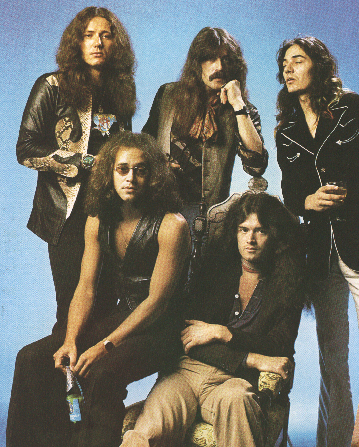Glenn Hughes
| Line 15: | Line 15: | ||
But guitarist Ritchie Blackmore didn't like the bands new direction and left in 1975 to form his own band. Tommy Bolin was hired as a replacement, and he and Glenn became best friends - which was not so lucky, since both of them was hard on drugs by that time. (Bolin later died of an overdose) After a chaotic tour in Japan, Deep Purple was broken up and Glenn returned to Trapeze for a short while. In -75 Glenn was also playing on Tommy Bolins solo album "Teaser". | But guitarist Ritchie Blackmore didn't like the bands new direction and left in 1975 to form his own band. Tommy Bolin was hired as a replacement, and he and Glenn became best friends - which was not so lucky, since both of them was hard on drugs by that time. (Bolin later died of an overdose) After a chaotic tour in Japan, Deep Purple was broken up and Glenn returned to Trapeze for a short while. In -75 Glenn was also playing on Tommy Bolins solo album "Teaser". | ||
| - | |||
| - | |||
| - | |||
Revision as of 21:32, 14 October 2009
Glenn Hughes (bass/vocals) was born 21 august 1951 in Cannock, Staffordshire, England. He is most known as a member of the legendary hard rock band Deep Purple between 1973-75, but has made several solo albums as well as beeing the lead singer of Black Sabbath between 1985-86. Glenn is possibly more known for his vocal abilities rather than his bass playing and is, as stated on his homepage, considered a "singer's singer" amongs other players.
Contents |
Early career
Glenn Hughes started his music career when he drop school in the 60's at the age of 16. Back then he was amember of a band called "Finders Keepers" which later changed their name to "Trapeze". In this band was also guitarist Mel Galley (later Whitesnake) and drummer David Holland (later Judas Priest). Glenn's early influences was mainly from Motown artists such as and he developed a funky style of bass playing along with a voice full of soul. He also mentions Beatles and early british hard rock. With Trapeze he made four albums: "Trapeze", "Medusa", "You Are The Music, We're Just The Band" and "Final Swing". Trapeze were also the opening act for Moody Blues on their U.S tour in 1969, but the never really made it to the charts, even that "You Are The Music, We're Just The Band" was causing a minor success.
The Big Break
When Roger Glover and Ian Gillan left Deep Purple in 1973, Glenn was called to replace both of them in conjunction with David Coverdale. In order to join Deep Purple he turned down an offer from Electric Light Orchestra, that also was a huge band at that time. The idea seemed to be to have two lead singers of a great caliber. Glenn's impact on the band is unmistakeable since they definitely moved to a funkier/soulier approach during the following years with Glenn.
In 1974 "Burn" was released and Glenn and Coverdale shared much of the lead vocals, even though Coverdale sang a little more. The combination of Coverdales bluesy voice and Glenns high range was a great combination and as Glenn stated: "David Coverdale is without a doubt a great shouter, but he couldn’t do the high passages, which is where I came in. As far as I’m concerned we were the perfect combination". Deep Purple released "Strombringer" the year after, which moved the bands style even more to a funkier/soulier style. Glenn was also voted "Best bass player of the Year" in the british music magazine Melody Maker.
But guitarist Ritchie Blackmore didn't like the bands new direction and left in 1975 to form his own band. Tommy Bolin was hired as a replacement, and he and Glenn became best friends - which was not so lucky, since both of them was hard on drugs by that time. (Bolin later died of an overdose) After a chaotic tour in Japan, Deep Purple was broken up and Glenn returned to Trapeze for a short while. In -75 Glenn was also playing on Tommy Bolins solo album "Teaser".
Living in L.A
Glenn moved to L.A in 1977 but released his first solo album "Play me out" prior to the relocation. His bandmates from Trapeze Mel Galley and Dave Holland was on the record and so was guitarist Pat Travers. During the following years Glenn was busy in the music scene, doing mostly sessions on other players records.
Meeting Pat Thrall
In L.A Glenn met Pat Thrall who also was with the Pat Travers band. But when Pat Travers went out of work the two of them decided to do an album together. The co-operation led to one of the most legendary records in the beginning of the 80's although it wasn't a commercial success. The album entitled Hughes/Thrall show's off Glenn's vocal resources (singing with a span of 4 1/2 octave) and some real heavy guitar/bass playing. By that time Glenn had severe problems with his overweight and maybe therefore was abusing drugs.
Mid 80's
Glenn joined a musical/movie project called "Phenomena" (a lot of rock stars were participating amongst them were Brian May, Tony Martin and John Wetton, Scott Gorham) led by Mel Galley's brother Tom Galley and was featured on the song "Believe" amongst others. He joined Black Sabbath as lead singer in 1986 and was present on the album "Seventh Star". After a fight with Black Sabbath's Tour Manager, Glenn got his throat hurted and was'nt able to sing properly at the tour. He was later replaced for the rest of the tour, and did'nt appear in Black Sabbath again. His health was rapidly getting worse, and at the end of the eighties some friends got him into the Betty Ford clinic (uncomfirmed, but he did get treatment).
The new career
In 1991 Glenn has recovered from all his illness, and spent a lot of time in Sweden touring/playing with Europe's guitar player John Norum as well as a lot of other Swedish musicians. He was participating on John Norums solo album "Face The Truth" and also sings on KLF's hit "America: What Time Is Love" from the same year. The next year Glenn released his second solo album entitled just "Blues" under the L.A Blues Authority project. Guests on the album included John Norum, Mick Mars of Mötley Crüe, Warren DeMartini of Ratt and Richie Kotzen of Poison , Mr. Big and Mark Kendall of Great White fame. Glenn claimed that the album is about his inner demons, since when he got clean had a belief in a "higher power".
Glenn kept beeing extremely productive throughout the 90's and recorded several solo albums as well as guested other artists record. One of the most remarkable may be "Burning Japan -Live" from 1995. The tour was a spin-off from the album "From now on..." in 1994 which was recorded in Sweden with the elite of the Swedish hard rockers at that time.
He returned to the studio and recorded the album "Feel", which he say is made only for himself. It shows a much lighter side of Glenn Hughes, singin Soul, Pop and even covers Stevie Wonders "Maybe Your Baby". For the first time since 1982, Pat Thrall is also present on 8 of the tracks.
In 1996 he released the album "Addiction" which deals with his earlier drug problems. It is co-produced/recorded with guitarist/song writer Marc Bonilla and present is also Joachim "JJ" Marsh, who became Glenns long time friend and has been present on all Glenns records since then. "Addiction" was Glenn's heaviest album so far in contrast to "From now on...", that had a more "pop" -style.
For the recording of the next album, J.J Marsh and Hughes locked themselves in at Glenn's home in L.A for abouth two months, before the actual recording to wrote the material present on the album. This release can best be desribed as core hard-rock even that funk guitarist Stevie Salas co-wroted two of the tracks. Ex. Gun's and Roses drummer Matt Sorum is present on two tracks, so is keyboard legend Keith Emerson. (Emerson, Lake & Palmer)
Worth to mention is that most of Glenn's U.S releases are distributed through Mike Varney's guitar oriented label "Shrapnel Records".
The new millenium to present
Glenn's first three own solo albums was very much in the same style, and none of them were really a commercial success, but kept Glenn busy by force him to tour in Europe and Japan, where he has a lot of fans since the Deep Purple days. He also recorded a Christmas album in 2000. Notable is that his album from 2003 (Songs in the key of Rock) is spinning on the title of one of his biggest influences: Stevie Wonder and his album "Songs in the key of life".
In 2002 he met up with ex. Rainbow singer Joe Lynn Turner, and they decided to work together. Glenn and JJ Marsh wrote all the songs for the album in just two day's and made the debut for "HTP" a.k.a Hughes/Turner project. The next year a follow up was recorded entitled: "HUGHES TURNER PROJECT 2" and Glenn stated: (although he is not known for commenting his own records)
"When you have two former members of Deep Purple and Rainbow, you have a pretty strong idea of your orientation. I think that today, if I were still a member of Deep Purple, this is the album that I would have written with them. I'm going to say something a bit pretentious: this is the album that Deep Purple would like to write, but they aren't capable of doing it."
A live album/DVD was recorded in 2004 named "Soulfully Live in the City of Angels". This release are a sum-up of Glenn's work from Deep Purple to that point and features drummer Chad Smith from Red Hot Chili Peppers.
In 2005 he was travelling to England to work with Tony Iommi. (Black Sabbaths guitar player in all years) The co-operation led to the album "Fused", which was selling pretty good and reached number 34 on Billboard's Top Heatseekers l. The same year was also "Soul Mover" released with guest guitarist Dave Navarro. (former Jane's Addiction and Red Hot Chili Peppers) The album went well on the charts, and was Glenn's most commercial success so far in the terms of solo releases. It was also voted 12'th best album of the year by highly influential UK magazine, "CLASSIC ROCK".
After he made "Music For The Divine" in 2007 he faced himself again touring worldwide as a main act, and he headlined Festivals in Norway and France. He was also appearing both 2006/2007 as guest presenter at the Classic Rock Awards in L.A. His current release is "First Underground Nuclear Kitchen", and is more soul/funk inspired than the latest solo albums.
Summin Up
Glenn Hughes had since Deep Purple in many ways acted as a role model for many singers/musicians, even that his fame never became that huge as with Deep Purple. Although he's more known as a singer, he's bass playing is very tight, and is a driving whenever present. He has been present on numerous recordings as a guest vocalist/bass player/back-up vocalist and one cannot underestimate his importance in the history of rock.
Related GMC Lessons
Motown funk
Larry Graham Style
Rock Bass-Lesson2
Videos








